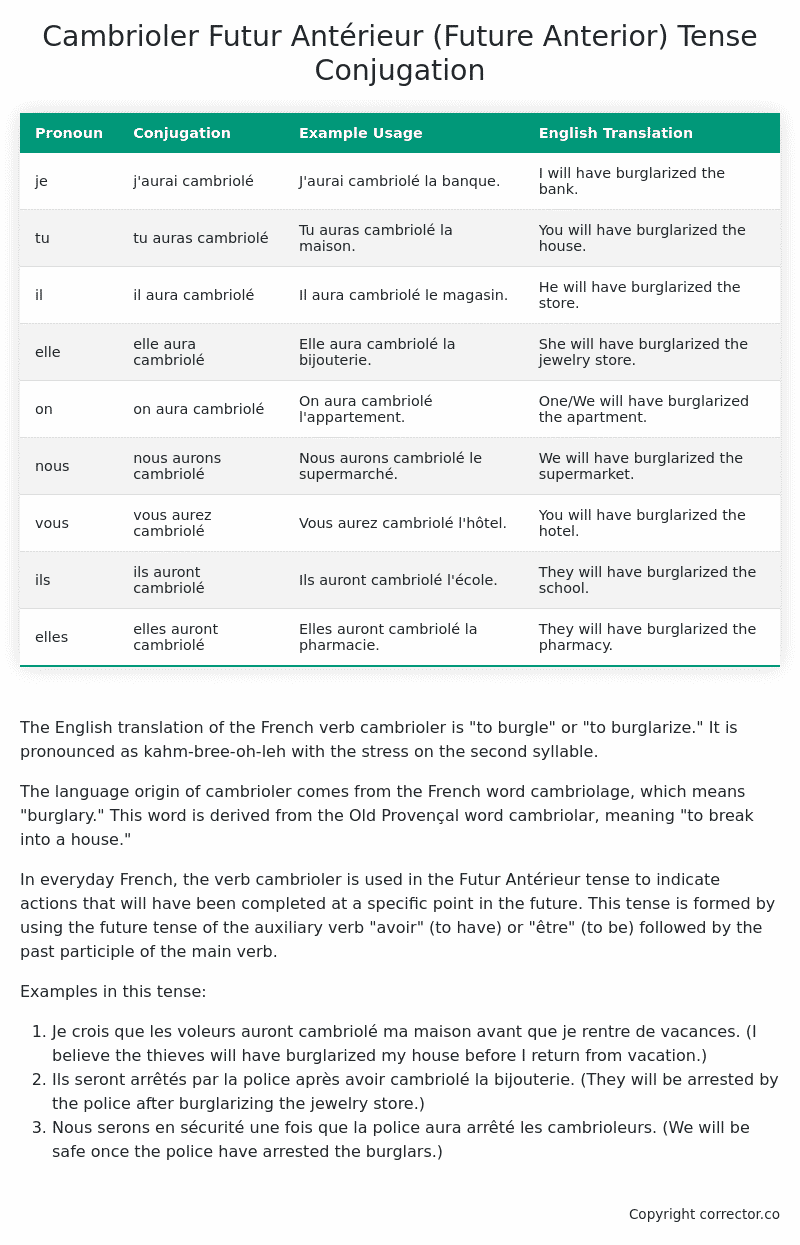Futur Antérieur (Future Anterior) Tense Conjugation of the French Verb cambrioler
Introduction to the verb cambrioler
The English translation of the French verb cambrioler is “to burgle” or “to burglarize.” It is pronounced as kahm-bree-oh-leh with the stress on the second syllable.
The language origin of cambrioler comes from the French word cambriolage, which means “burglary.” This word is derived from the Old Provençal word cambriolar, meaning “to break into a house.”
In everyday French, the verb cambrioler is used in the Futur Antérieur tense to indicate actions that will have been completed at a specific point in the future. This tense is formed by using the future tense of the auxiliary verb “avoir” (to have) or “être” (to be) followed by the past participle of the main verb.
Examples in this tense:
- Je crois que les voleurs auront cambriolé ma maison avant que je rentre de vacances. (I believe the thieves will have burglarized my house before I return from vacation.)
- Ils seront arrêtés par la police après avoir cambriolé la bijouterie. (They will be arrested by the police after burglarizing the jewelry store.)
- Nous serons en sécurité une fois que la police aura arrêté les cambrioleurs. (We will be safe once the police have arrested the burglars.)
Table of the Futur Antérieur (Future Anterior) Tense Conjugation of cambrioler
| Pronoun | Conjugation | Example Usage | English Translation |
|---|---|---|---|
| je | j’aurai cambriolé | J’aurai cambriolé la banque. | I will have burglarized the bank. |
| tu | tu auras cambriolé | Tu auras cambriolé la maison. | You will have burglarized the house. |
| il | il aura cambriolé | Il aura cambriolé le magasin. | He will have burglarized the store. |
| elle | elle aura cambriolé | Elle aura cambriolé la bijouterie. | She will have burglarized the jewelry store. |
| on | on aura cambriolé | On aura cambriolé l’appartement. | One/We will have burglarized the apartment. |
| nous | nous aurons cambriolé | Nous aurons cambriolé le supermarché. | We will have burglarized the supermarket. |
| vous | vous aurez cambriolé | Vous aurez cambriolé l’hôtel. | You will have burglarized the hotel. |
| ils | ils auront cambriolé | Ils auront cambriolé l’école. | They will have burglarized the school. |
| elles | elles auront cambriolé | Elles auront cambriolé la pharmacie. | They will have burglarized the pharmacy. |
Other Conjugations for Cambrioler.
Le Present (Present Tense) Conjugation of the French Verb cambrioler
Imparfait (Imperfect) Tense Conjugation of the French Verb cambrioler
Passé Simple (Simple Past) Tense Conjugation of the French Verb cambrioler
Passé Composé (Present Perfect) Tense Conjugation of the French Verb cambrioler
Futur Simple (Simple Future) Tense Conjugation of the French Verb cambrioler
Futur Proche (Near Future) Tense Conjugation of the French Verb cambrioler
Plus-que-parfait (Pluperfect) Tense Conjugation of the French Verb cambrioler
Passé Antérieur (Past Anterior) Tense Conjugation of the French Verb cambrioler
Futur Antérieur (Future Anterior) Tense Conjugation of the French Verb cambrioler (this article)
Subjonctif Présent (Subjunctive Present) Tense Conjugation of the French Verb cambrioler
Subjonctif Passé (Subjunctive Past) Tense Conjugation of the French Verb cambrioler
Subjonctif Imparfait (Subjunctive Imperfect) Tense Conjugation of the French Verb cambrioler
Subjonctif Plus-que-parfait (Subjunctive Pluperfect) Tense Conjugation of the French Verb cambrioler
Conditionnel Présent (Conditional Present) Tense Conjugation of the French Verb cambrioler
Conditionnel Passé (Conditional Past) Tense Conjugation of the French Verb cambrioler
L’impératif Présent (Imperative Present) Tense Conjugation of the French Verb cambrioler
L’infinitif Présent (Infinitive Present) Tense Conjugation of the French Verb cambrioler
Struggling with French verbs or the language in general? Why not use our free French Grammar Checker – no registration required!
Get a FREE Download Study Sheet of this Conjugation 🔥
Simply right click the image below, click “save image” and get your free reference for the cambrioler Futur Antérieur tense conjugation!

Cambrioler – About the French Futur Antérieur (Future Anterior) Tense
Construction
Common Everyday Usage Patterns
Interactions with Other Tenses
For example
Summary
I hope you enjoyed this article on the verb cambrioler. Still in a learning mood? Check out another TOTALLY random French verb conjugation!


